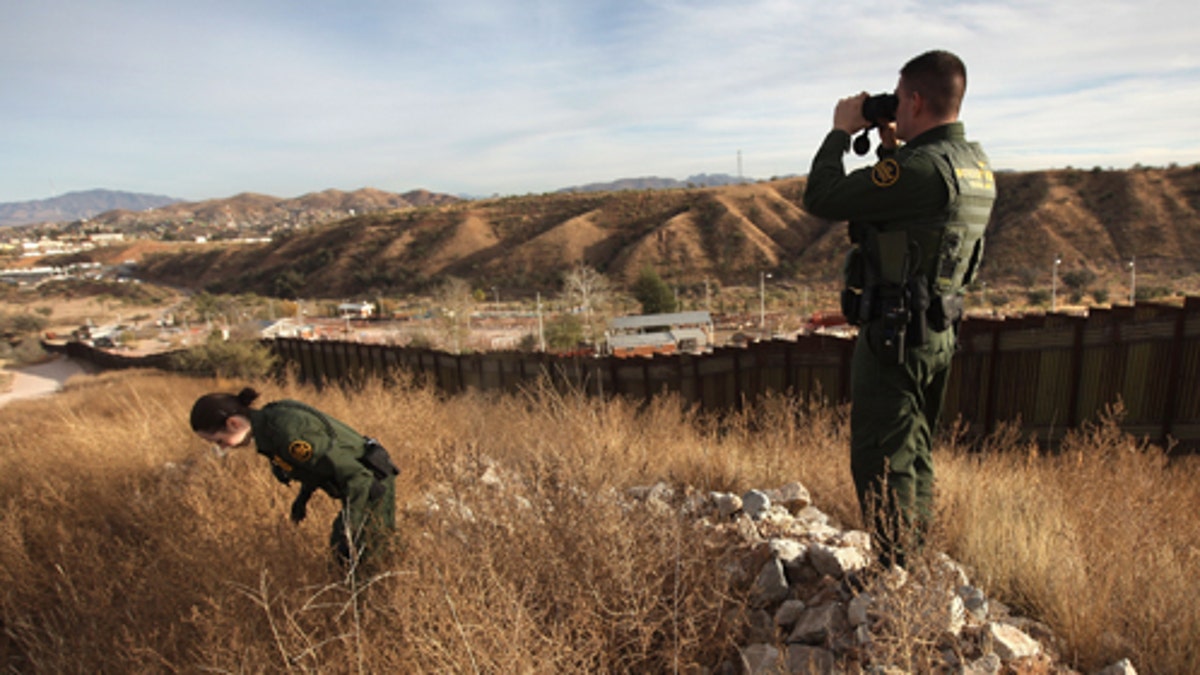
NOGALES, AZ - DECEMBER 07: U.S. Border Patrol agents Richard Funke and Colleen Agle look for illegal immigrants crossing the U.S.- Mexico border on December 7, 2010 near Nogales, Arizona. Although a new fence has been built along the majority of Arizona's border with Mexico, critics have called for fencing of the entire stretch. Much of the unfenced terrain is in remote and mountainous areas. Although illegal immigration has slowed all along the U.S. Mexico border, Border Patrol officials say the Tucson sector remains the most heavily trafficked in the nation. (Photo by John Moore/Getty Images) (2010 Getty Images)
The Mexican ambassador to the United States said he condemns the cross-border shootings by U.S. Border Patrol agents, which have killed seven people on the Mexican side since 2010.
In an interview with Fox News Latino, Ambassador Arturo Sarukhan said Mexico strongly rejects, and has never, nor will ever tolerate the discharging of firearms across international borders and into Mexican territory by any U.S. law enforcement agent or individual.
"As a matter of fact, the firing of weapons across international borders runs counter to basic principles of international law," Sarakhan said. "We have clearly and repeatedly expressed our strongest condemnation whenever these incidents have occurred, as well as the need for thorough investigations and for those found responsible to be brought to justice, both in the United States and in Mexico."
Live ammo to repel rocks being thrown over the fence, or shots in the back of a teenager on Mexican soil, are simply unacceptable
Ami Carpenter, associate professor in the Joan B. Kroc School of Peace Studies at the University of San Diego, said the international implications of cross-border shootings are profound.
“Whether a border shooting represents an infringement or violation of an international border between two countries is typically a subjective assessment based in large part on the bilateral relationship," Carpenter said. "The relationship between the U.S. and Mexico includes historical antagonisms that make it easy for people on both sides of the border to view this incident as an act of bullying at the least, and perhaps more seriously an infringement of international human rights law.”
The position of the Border Patrol is predicated on officer safety when confronted with what they perceive as life threatening circumstances that would necessitate the use of deadly force, such as recent incidents where agents were allegedly pelted with rocks.
"Mexican and U.S. officials have agreed on how to address a wide range of activity, such as border violence incidents, that satisfies both nations," said Michael Friel, spokesperson for U.S. Customs and Border Protection. "As a rule, CBP personnel will not enter foreign territory without authorization from that nation; however, if agents are attacked, they have the right to defend themselves, their fellow agents and innocent third parties, including the use of lethal force when necessary, even if the attacks are not on the U.S. side of the border," he added.
The most recent incidents with Mexican fatalities occurred in Nogales this October and in January 2011. Following the October shooting, an investigation was launched by the Inspector General of Homeland Security regarding the Border Patrol's use of deadly force policies.
And between 2008 and 2010, official figures show Border Patrol agents allegedly killed 18 Mexicans, many of whom were teenagers, along the 1,969 mile border. Eight were allegedly throwing rocks at agents.
As for Border Patrol agents, 10 have died along the U.S.-Mexico border since 2010, none of which were the result of attacks with rocks.
"No one is challenging the right or the need to guarantee the safety of U.S. agents on the border, but live ammo to repel rocks being thrown over the fence, or shots in the back of a teenager on Mexican soil, are simply unacceptable and fly in the face of the sea-change that has occurred in our law-enforcement and security cooperation," Sarakhan said
Published reports allege the victims were involved in human or drug trafficking activities.
The quandary for the victim's families not only lies in the lack of criminal prosecutions or significant disciplinary action for wrongful shootings but the virtual impossibility of winning a civil suit.
In August 2011, U.S. District Court Judge David Briones dismissed the civil law suit filed by the family of 15-year-old Sergio Adrian Hernández Guereca who was shot to death by Border Patrol Agent Jesus Mesa Jr. in June of2010, on the banks of the Rio Grande River between El Paso, Texas and Ciudad Juárez.
Briones ruled that U.S. civil law does not apply to incidents that occur in a foreign country.
While Mesa was cleared of the shooting, he was charged with murder in Chihuahua where Governor César Duarte demanded his extradition to face trial in Mexico where, if convicted, Mesa could serve between 20-25 years in prison.
"I cannot emphasize enough the need for both our countries to strengthen our cooperation so that these incidents do not happen again," Sarakhan said. "That means both the tacit or official green light to discharge weapons from the U.S. side of the border into Mexico to confront rockings, as well as the need for Mexican authorities to prevent and deter rocking incidents into U.S. territory from either drug traffickers or human smugglers."
